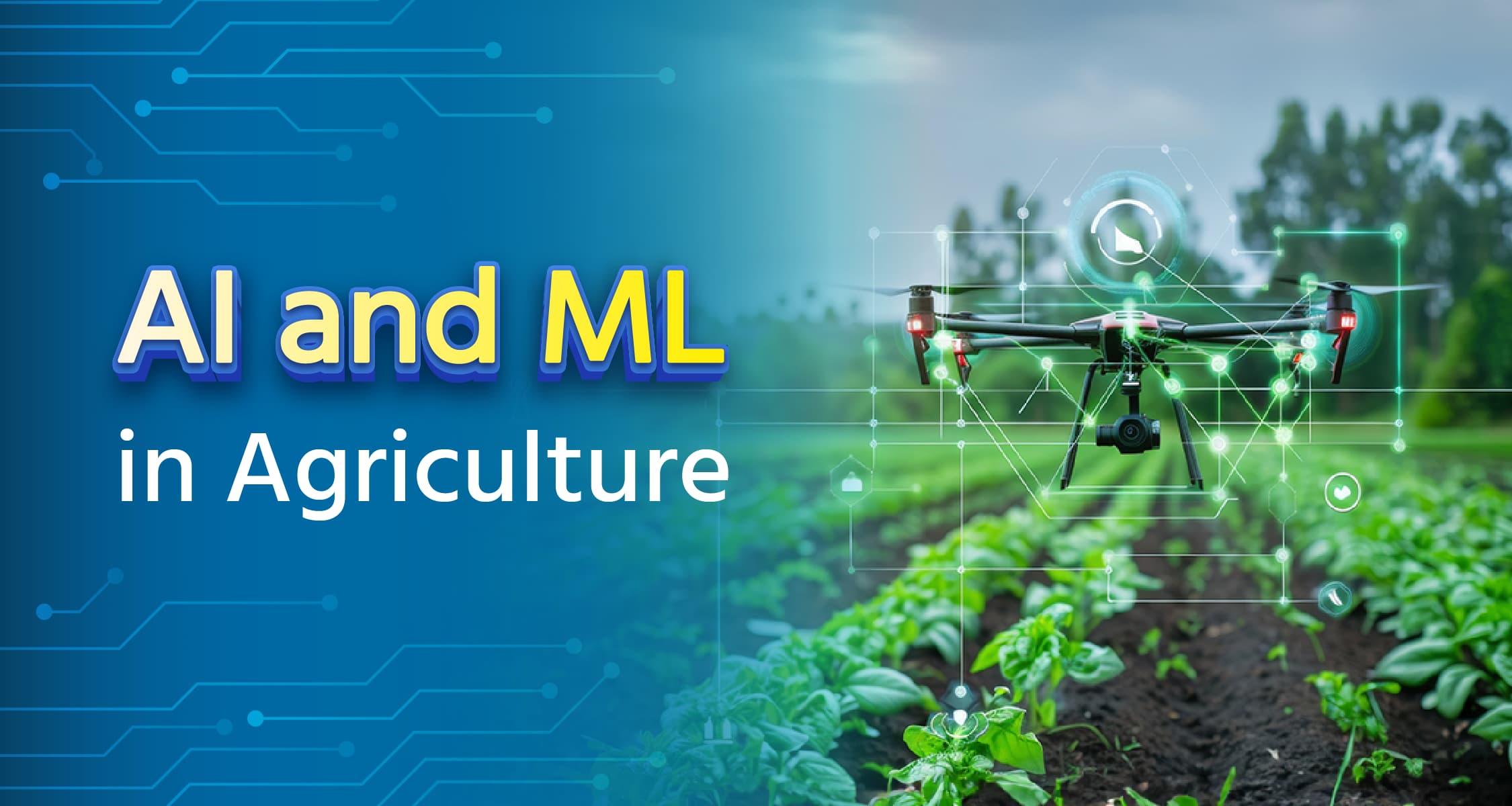AI and ML in Agriculture

AI and ML have come a long way in agriculture. The latest technological innovations and developments are based on AI and ML models that help in predicting possible inputs, adverse events, etc., and assess the current data related to agriculture for optimized farming. Technological solutions like drones, geo-tagging, smart greenhouses, etc. all use AI and ML models to fetch valuable information that can improve the production of agricultural products and in-field farming operations.
What are Artificial Intelligence and Machine Learning Technologies?
Artificial intelligence enables machines to perceive, think, and act like human beings whereas machine learning is a subset of AI that allows devices or machines to learn from various data without being programmed. Artificial intelligence is a bigger concept that engulfs the machine learning scope.
AI and ML are used in various industries to make their systems more efficient and smart, minimizing the involvement of human beings. This helps in faster response and decision making eliminating instances of human errors.
These systems are on the developing path in the agriculture sector that has shown quite promising scope to improve farming operations leading to increased productivity and efficiency.
Involvement of Artificial Intelligence(AI) and Machine Learning(ML) in Agriculture
Solutions through AI and ML models have come a long way in agriculture. These technologies are quite deeply involved when we talk about technological solutions in the agricultural space.
- Cognitive Solutions: Through smart systems, substantial volumes of data originate from farmlands on a daily basis. AI and ML models use these data to extract valuable information to give cognitive solutions that can help farmers considerably. The data used can be rainfall records, soil test reports, weather patterns, etc. From these data, farmers can get insights on irrigation requirements, agrochemical requirements, future rainfall predictions, etc. that can assist the farmers big time in having a successful harvest.
- Insights through Images: Drones and geo-tagging are some of the technologies that help in generating image-based data that can aid in valuable decision-making for farming. These technologies can monitor crops in real time and provide data for rapid actions by farmers. Pest attacks, disease outbreaks, floods, droughts, heavy rainfall, etc. can be predicted to prepare the farmers for the situation so that they can handle it easily.
- Crop Growing Decisions: Based on various data from soil reports, rainfall patterns, weather conditions, etc. AI and ML models can give valuable insights through which a farmer can make decisions on what type of crop can be cultivated. This will help farmers to prevent growing such crops that are not suitable to avoid low yields and other damages.
- Monitoring of Crop Health: AI and ML-based smart systems enable it to monitor crops in real-time starting from its sowing to harvesting. Throughout the entire lifecycle of the crop, it will be minutely monitored in order to provide suitable nutrients, irrigation, agrochemicals, etc. This will aid the farmers to produce high yields of good quality agri-commodities preventing any mass losses or damages.
- Increasing Yield through Automatic Irrigation: Irrigation is one of the intensive farming operations in agriculture. Automated irrigation can make a viable improvisation of yield and quality. Irrigation automated based on soil conditions, crop type, and weather patterns can enhance the overall harvest. Moreover, it will also help farmers to manage their water usage optimally considering it an important natural resource.
Constraints of Using AI and ML in Agriculture
AI and ML-based models have some lucrative advantages when adopted in agriculture. However, there are quite a few constraints that need to be considered before adopting these technologies.
- Adoption and Awareness of Technology: AI and ML models are advanced forms of technological development that need some serious understanding and training in order to use them appropriately. Farmers should be acquainted slowly with lesser forms of technological developments initially and then gradually make them adopt these smart forms of technology. This process can be a time-consuming endeavor for farmers. Farmers across developing countries are quite less aware of the technological developments happening in the current times. They need proper awareness about the technological solutions evolving in order to have a basic understanding. Further, this can be useful when they are trained and prepared to use these advanced forms of technologies on their farms.
- Security Mandates: The usage of smart technologies and devices comes with various privacy and security mandates that need to be adhered to. Farmers need to be fully aware of such policies and rules in order to use and operate these smart devices and systems. However, many developing countries are yet in the process of drafting and implementing policies related to these technologies.
- Costly: Devices used for carrying out AI and ML functionalities are quite expensive. These devices can be cost-effective in the long run but they can cost a fortune for small and average farmers considering the initial investment.
Would you like to adopt AI and ML technologies in your crop cultivation? Share your answers and experiences with us in the comments. For more information on modern technologies related to the agricultural sector, follow the 'Krishi Tech' channel now. Also, don't forget to like this post and share it with more and more farmers.
Frequently Asked Questions (FAQs)
Q: How is artificial intelligence applied in the field of agriculture?
A: AI-driven technologies are utilized in agriculture to predict weather patterns, oversee sustainable farming practices, and detect diseases, pests, and nutrient deficiencies in crops. These systems analyze data such as temperature, rainfall, wind speed, and solar radiation, alongside images captured by satellites and drones.
Q: Is machine learning beneficial in the agricultural sector?
A: Yes, machine learning is utilized in agriculture. It analyzes sensor data to assess soil composition and health. This information enables farmers to make more informed decisions regarding fertilizer use, crop rotation, and other practices to enhance soil fertility.
Q: Can AI assist farmers in making more informed decisions?
A: Predictive analytics has proven to be a significant advantage for the agriculture sector. It aids farmers in tackling essential farming challenges, including market demand analysis, price predictions, and identifying the ideal times for planting and harvesting crops. Additionally, AI-driven equipment can assess soil and crop health, offer fertilizer suggestions, monitor weather conditions, and evaluate crop quality. These AI benefits help farmers make more informed decisions and improve farming efficiency.
Please login to continue

Get free advice from a crop doctor
